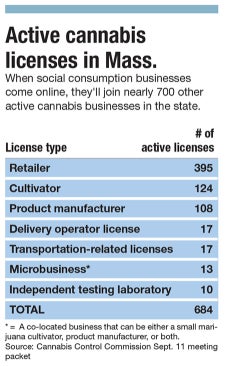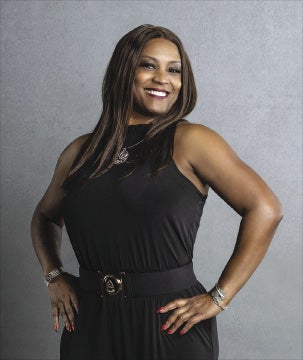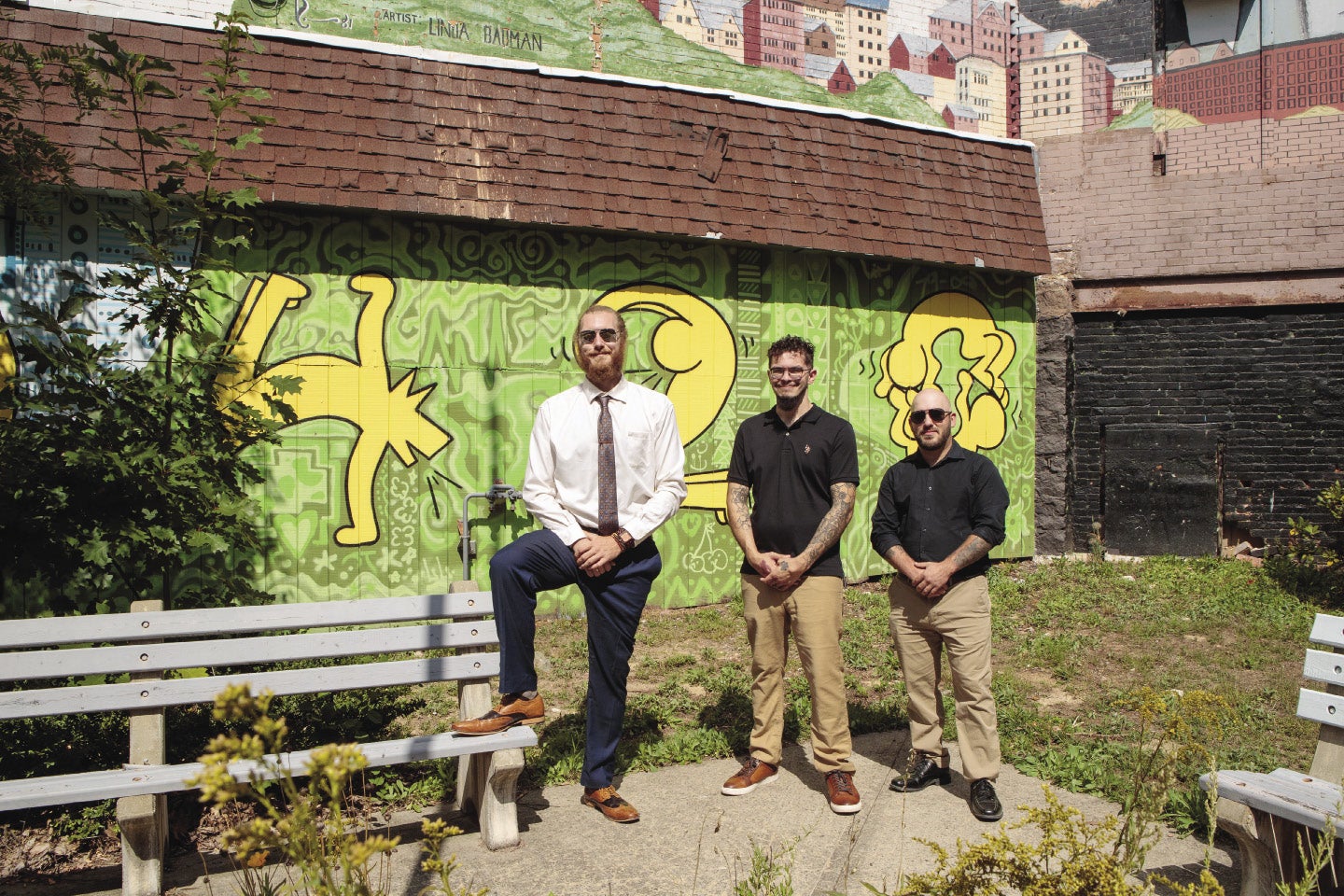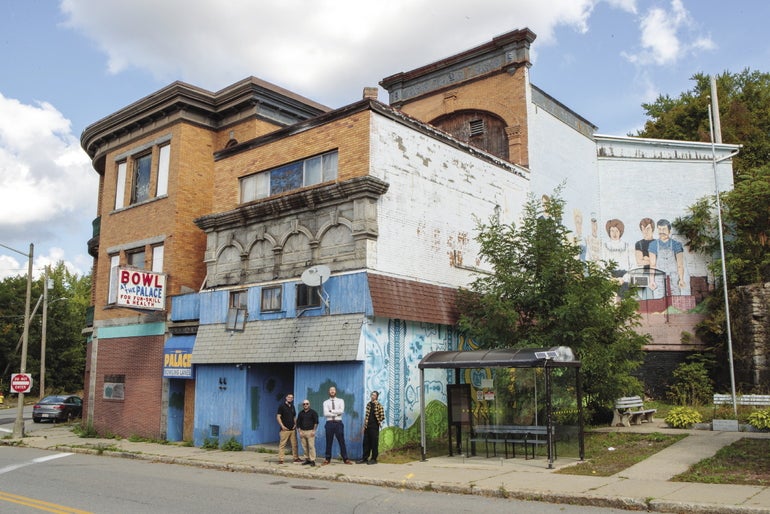Law enforcement and some municipal voices have called for strict regulations for consumption sites. But advocates warn overregulating these businesses will make them stiff and sterile, killing their viability and leaving social equity participants out in the cold
Get Instant Access to This Article
Subscribe to Worcester Business Journal and get immediate access to all of our subscriber-only content and much more.
- Critical Central Massachusetts business news updated daily.
- Immediate access to all subscriber-only content on our website.
- Bi-weekly print or digital editions of our award-winning publication.
- Special bonus issues like the WBJ Book of Lists.
- Exclusive ticket prize draws for our in-person events.
Click here to purchase a paywall bypass link for this article.
As Massachusetts approaches a decade since recreational cannabis was first legalized, marijuana businesses are a common sight. But with public consumption still banned, consumers have been left to enjoy these now-legal products in private settings or while nervously looking over their shoulder in public.
That could soon change. While it was part of the original legalization pitch in 2016, the state is now working to finalize regulations to govern social consumption sites. Commonly referred to as cannabis cafes, these venues would operate much like bars, but with the alcohol replaced with marijuana products.
Plans call for social consumption licenses for the first 60 months for a select group of pre-existing business licenseholders and participants in the state’s Social Equity Program participants and Certified Economic Empowerment Priority applicants, both part of wider efforts to promote business growth in disadvantaged communities and make up for harms caused by the state’s War on Drugs, which disproportionately targeted minority populations.
Law enforcement and some municipal voices have called for strict regulations for consumption sites. But advocates warn overregulating these businesses will make them stiff and sterile, killing their viability and leaving social equity participants out in the cold.
With a final vote on regulations expected this fall, Cannabis Control Commission regulators will have to walk a fine line to appease all stakeholders involved, ensuring businesses will be both safe and viable, while providing meaningful opportunity for disadvantaged groups who are still looking for a path into the cannabis industry.
Mass. surpassed by other states
While they exist in other countries including Jamaica and The Netherlands, Massachusetts was the first state to include the concept of social consumption licenses in its adult-use cannabis laws.
However, due to a number of unexpected hurdles, the state has yet to roll out these types of business almost nine years after voters first approved them.
While CCC is supposed to be an independent agency, then-Gov. Charlie Baker and then-Attorney General Maura Healey (now the governor) put their thumbs on the scale in 2018 when they strongly suggested CCC focus its limited resources on getting cultivation and dispensaries business open rather than cannabis cafes. CCC complied with this request.

Then, a drafting error in state law meant there was no way for municipalities who were interested in hosting social consumption sites to opt-in to do so. This was fixed by the state legislature in 2022.
CCC had previously considered launching a limited pilot program to allow for cannabis cafes in up to 12 communities, but regulators decided to scrap that plan in 2023, instead shifting focus to a full rollout. By then, scrapping the pilot program made sense, as a number of other states with legalized recreational marijuana had already moved forward with allowing for consumption sites.
Washington D.C., the U.S. Virgin Islands, and 12 states allow social consumption in some capacity, according to CannaBusinessPlans.com. One of these states is New Mexico, where Marvina Thomas opened the Fourtwenty Collections Dispensary and Consumption Lounge in the city of Las Cruces.

“I founded the first Black, woman-owned dispensary in Arizona,” Marvina Thomas wrote in an email to WBJ. “As we looked to expand, we fell in love with Las Cruces and started a dispensary there. We knew that a cannabis business could be an important part of the community if done right. When the opportunity presented itself for us to acquire a building zoned for a consumption lounge, we took the leap.”
Realizing her business had to be more than just a place to sit around and smoke marijuana, Thomas’ lounge includes a restaurant and has become a go-to place for local organizations to host events, she wrote.
“We have positioned our consumption lounge as a community center and gathering place,” Thomas wrote. “We have everything from business meetings and student study groups happening on weekdays, to hip hop artists and DJs performing on the weekends. Our restaurant sales increase daily. We are responsive to what our customers want.”
Plans in Fitchburg
The constantly changing timeline and plans for social consumption in Massachusetts have made it difficult for entrepreneurs to solidify their business concepts. Yet, four young entrepreneurs with ties to the Fitchburg area are forging ahead anyway.
While CCC works on finalizing regulations, Guy Gormley, Matthew Boone, Mat Meadows, and John Quartarone have dreamt up the concept of The Roasted Bean, a cafe and entertainment venue they are hoping to open at 80 Daniels St., a unique three-story structure once occupied by the New Palace Bowling Lanes, which is in need of revitalization.
Boone has already beat the odds, growing up mostly in the foster care system to working as an engineer at Commonwealth Fusion Systems, the $2-billion, Devens-based energy firm which has captured global attention for its ambitious quest to commercialize nuclear fusion technology.
For him, this personal side endeavor is an attempt to bring that same innovative spirit to the cannabis space.
“I wanted to do something for the world, and I found a place that I could do that,” Boone said of CFS. “I found this skill set, this way of executing ideas, and I’m really just carrying that over to this project.”
Gormley comes from a slightly different background, foregoing college to instead live with Buddhists in Upstate New York before spending time backpacking across the West Coast. For him, The Roasted Bean presents the opportunity to do good while doing well.
“It carries the financial opportunity to provide to build something that can actually make a positive impact,” he said. “Cannabis is something that I personally love. It's a huge industry that will be able to fund a force for powerful good, and that's what I'm trying to build with it.”

The plan is to make a welcoming space for all, not just seasoned cannabis consumers, said Boone and Gormley.
Upon entering, the plan is for The Roasted Bean to appear to be a regular coffee shop. But pulling a book on a bookshelf will reveal a speakeasy-like entry to the rest of the space, with plans for a 750-seat venue, a snack shack, and a steady stream of various events to keep guests entertained.
Noting how many other cannabis businesses have set up shop in the Fitchburg area, Gormley said their proposed business would fit right in, as the city works to revitalize itself.
“There's still a lot of beautiful details, original details inside and outside the building,” Gormley said. “We fell in love with it. We want to restore this crown jewel of Fitchburg.”
Regulatory pros and cons
To the northwest of Fitchburg, cannabis entrepreneur and social equity program participant Derek D'Ambrosio is interested in one day operating a social consumption site at a dispensary he’s working to open in Ashburnham. He said one benefit of the proposed regulations is they allow for such co-located businesses, rather than requiring social consumption spots to be their own separate sites.
This will be more viable as a business model, D'Ambrosio said.
The plan is for a cannabis lounge with outdoor space, trying to take advantage of Ashburnham’s rural setting and close proximity to New Hampshire, the lone New England state where recreational cannabis remains illegal.
A number of hurdles remain though, D'Ambrosio said, including assuring regulators and other stakeholders are okay with smoking at the site, instead of just cannabis drinks and edibles.
“Everybody's really touchy with smoking, but I feel like having a smoking section is essential for these things to work,” he said. “There's a lot of red tape we have to get through, and then assuming we do get through all that red tape, I still have to build it out to compliance. I just got a quote for insurance on a very minimal outdoor lounge, and it's like over $11,000 a year. That's just general liability. If you compare that to any other industry, and you can see, like we get hit with the cannabis tax.”
Mirroring the 2016 ballot initiative which asked the state to regulate cannabis like alcohol, D’Ambrosio hopes the state thinks of business viability when crafting regulations. He took issue with a few different aspects of the proposed rules, including restrictions on how much can be sold to a customer and restrictions on selling food that isn’t pre-packaged.
At a Sept. 8 hearing, a number of advocates took issue with a proposal to require mandatory cooling down areas, designated spaces marked with signage intended to be safe spaces for people who may have overconsumed to allow for the effects to dissipate.
“If CCC makes these things so tough that I can't afford it and I can't get any investors to invest, this is going to be a waste of time,” D’Ambrosio said. “So we do have a lot against us.”
Eric Casey is the managing editor at Worcester Business Journal, who primarily covers the manufacturing and real estate industries.

